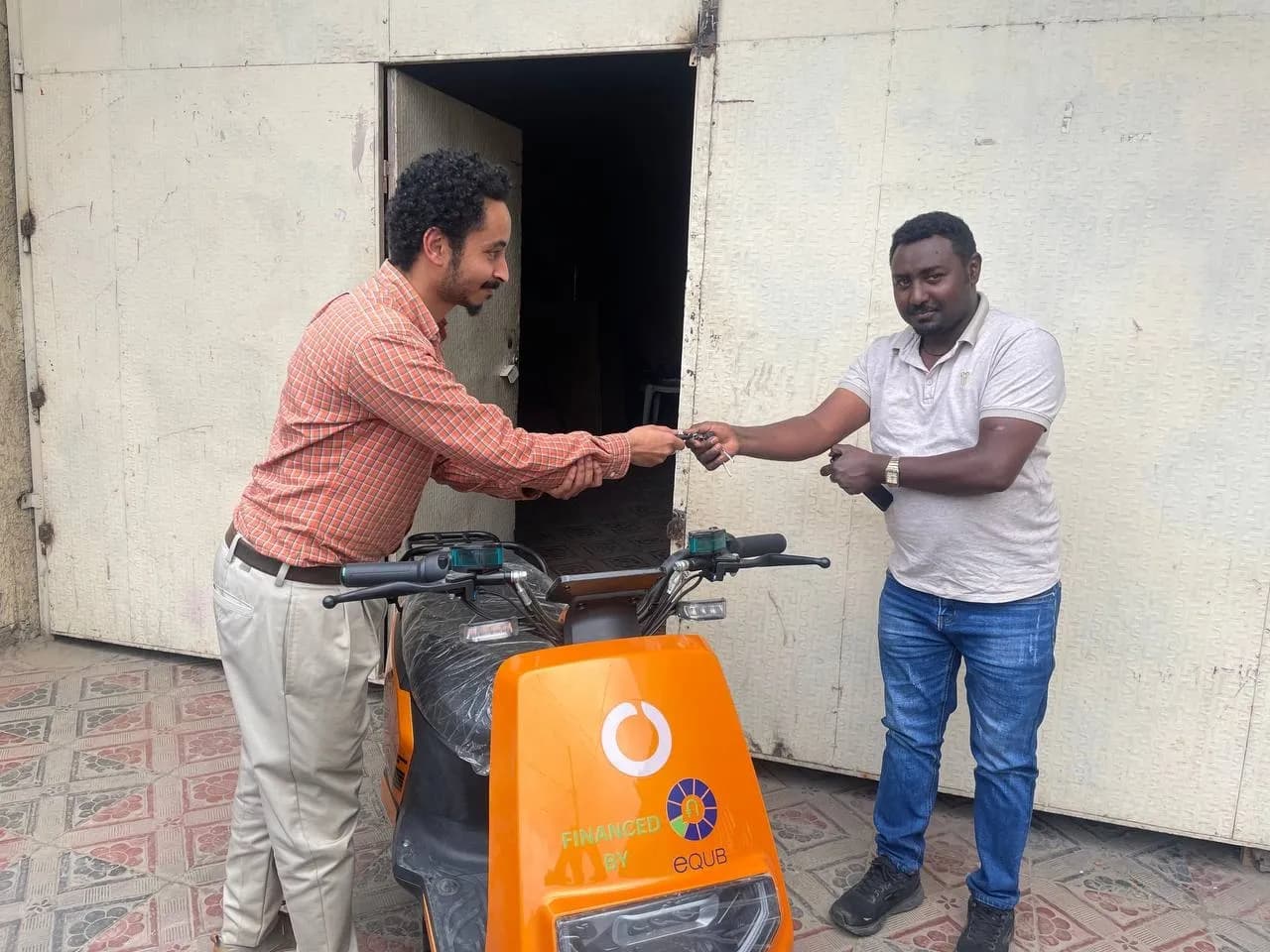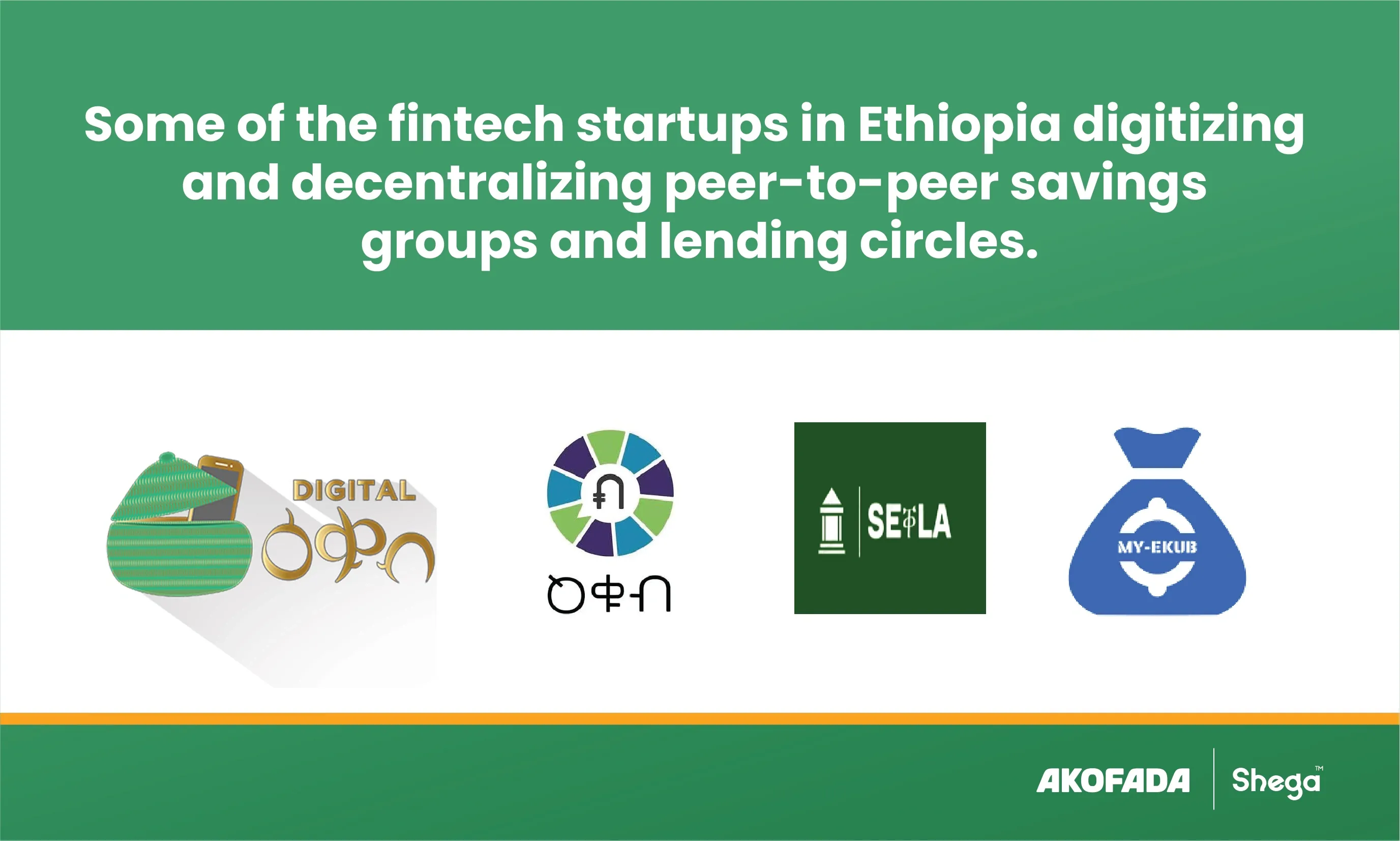Progress for 0 ad
Progress for 1 ad
Progress for 2 ad
Progress for 3 ad


Kaleab Girma
Addis Ababa, Ethiopia

In a world where financial inclusion continues to be a critical issue, innovative solutions sometimes arise from unexpected sources. As global fintech trends shift toward sustainable, savings-focused models, the opportunity to transform Equb into a contemporary financial tool has never been more promising. However, exploitative practices threaten Equb's integrity, underscoring the need for regulation to safeguard participants without stifling innovation.
This article is provided by AKOFADA (Advancing Knowledge on Financial Accessibility and DFS Adoption), a project working to increase knowledge and transparency within Ethiopia’s DFS ecosystem.
Featured Image: eQUB app handing over an electric motorbike to a user after successfully financing it. Source- eQUB app.
After graduating from law school in 2017, I didn’t want to immediately jump into a job. I wanted to take some time for myself and figure out where I was headed in life. However, living in Ethiopia, “finding yourself” is a luxury, and I soon realized I needed to find a way to support myself financially.
In these circumstances, I began brainstorming, which led to the inception of a business idea. Its simplicity, low capital requirement, and untapped market potential made it an ideal venture to pursue at that time.
The idea was to build a photo booth—a modern kiosk or vending machine that could take automated photos and print them instantly. After researching how to build such a booth, I utilized available online resources to design it. The booth would include all the right elements: a screen where you could see yourself, a printer capable of producing photos in seconds, a laptop to run the photo booth software, and a booth to house everything together. I even found a way to operate the booth with either a coin or a button press. The plan was to sell or rent these photo booths at events.
Once I had estimated the costs, I faced challenges in funding the project. Being unemployed, I couldn’t finance it myself, and my family couldn’t fully support me. That’s when my mother proposed a clever solution: using Equb, a traditional Ethiopian peer-to-peer savings and lending system, to fund the business.
I reached out to close friends and family, explaining that the purpose of the Equb was to finance the photo booth. I would manage the collection, take the first round of Equb funds for myself, and administer the lottery drawing until everyone was paid out.
They agreed to support me, and an Equb for around 50,000 birr was started. Just like that, I had the funds to turn my idea into reality, and my photo booth business, which I called Photo Jeblo, was born.
Unfortunately, the business struggled to grow and was hit hard during the COVID-19 pandemic, as it relied heavily on events. I closed it in 2021.
While my career path took a different turn—into journalism, where I now focus on startups and small businesses—the lessons from my Equb experience remain relevant. Interestingly, when I interview startup founders, I often come across entrepreneurs who kickstarted their ventures through Equb.
Equb is a type of rotating savings and credit association (RoSCA) deeply rooted in Ethiopian tradition. Members contribute equal amounts of money at regular intervals, and the pooled sum is awarded to one member in rotation, typically determined by lottery. This cycle continues until every member receives their share.
Equbs play a crucial role in improving access to credit, encouraging savings, and addressing communal needs. In many cases, there is no formal contract or written agreement but rather a verbal agreement and a spirit of trust and cooperation that binds the members together.
Studies show that many entrepreneurs and micro, small, and medium enterprises (MSMEs) turn to Equb for startup and working capital. This reliance stems from limited access to formal financial services. MSMEs often lack the collateral demanded by banks, and banks are reluctant to lend due to the high costs and risks associated with small enterprises.
Even in Merkato, Africa’s largest open-air market, Equb is widely practiced for both business and social purposes.
In addition, Equb has not only survived but thrived in the face of modernity and globalization. They’ve even become transnational financial institutions through migration. For example, Ethiopian immigrants in the U.S. use Equbs to enhance their financial well-being and strengthen community ties.
The concept of Equb is also not unique to Ethiopia. Similar systems exist across Africa, such as Susu in Ghana, Esusu in Nigeria, Chiperegani in Malawi, Mchezo in Tanzania, and Tontiniers in Francophone countries.
Scholar Worku Nida, in his paper Wealth in People, highlights Equb’s dual function as both investment and credit. He argues that Equb members serve as both investors and borrowers, creatively mobilizing and generating various forms of capital. His concept of “wealth in people” emphasizes how Equb participants create tangible wealth (money) and intangible wealth (social networks and relationships) by investing in social capital. This cyclical process showcases Equb as a dynamic system of wealth generation embedded in trust and relationships.
While this has been the history of Equb, being a cornerstone of social and economic life, a function it continues to fulfill today, its next chapter looks even more promising.
In a world where financial inclusion remains a pressing challenge, innovative solutions can emerge from unexpected places. Today, as global fintech trends lean toward sustainable and savings-driven models, the potential for Equb to evolve into a modern financial tool has never been clearer.
Consider the global rise of Buy Now, Pay Later (BNPL), which took the world by storm, enabling consumers to purchase items upfront while spreading payments over time. The sector gave rise to major players like Klarna, which at its peak was among the most valuable fintech companies in the world. Locally, Ethiopia has seen initiatives like Dashen Bank’s Dube Ale enter the BNPL space.
The standard BNPL framework allows customers to acquire items instantly after passing a credit check and making a 20–25% down payment. The remaining balance is divided into equal installments over a set period.
Despite its initial success, questions about BNPL’s long-term sustainability have emerged. Klarna, for instance, experienced a staggering valuation drop of 85%—from around $46 billion in mid-2021 to $7 billion a year later—as its losses tripled.
Amid these challenges, a growing number of innovators are rethinking credit-driven models like BNPL. Critics argue these systems encourage impulse spending, debt cycles, and other undesirable financial behaviors. As a result, attention is shifting to alternatives that emphasize savings over debt.
The emerging ‘save now, buy later’ (SNBL) model takes a fundamentally different approach. Instead of immediate access after a partial payment, consumers save incrementally through installment plans and only receive their desired items after fully paying the purchase price.
What SNBL does is provide a platform to enable and incentivize customers to save with a purchase in mind.
Notable SNBL platforms include Austria’s Monkee, the UK-based Cashmere, which focuses on women’s savings, and Accrue Savings from the U.S., which raised $25 million in Series A funding. The SNBL model has also found fertile ground in emerging markets, particularly in India, where platforms like Tortoise, Hubble, and Multipl are leading the charge.

These companies adopt varied revenue models: some partner directly with brands to earn commissions, while others work with wholesalers to acquire inventory at low prices, profiting from retail markups.
In addition, they partner with brands to embed SNBL options at checkout. Customers also earn cash rewards at savings milestones, reducing the cost of their purchases. If a customer changes their mind, they can withdraw their savings at no cost (excluding any retailer-added cash rewards).
These global fintech trends highlight the growing preference for savings-driven models. Equb’s communal savings ethos seamlessly aligns with the ‘save now, buy later’ approach, offering a sustainable path for financial empowerment in Ethiopia.
Viewing Equb through this lens could transform the traditional Equb into a modern zero-interest alternative to conventional lending, merging tradition with modern fintech innovation to empower financial inclusion in Ethiopia.
For instance, imagine a father who wants to purchase a TV but lacks the funds upfront. By joining a digital Equb platform that has partnered with a merchant that sells TVs, he can set a specific savings goal to buy the TV and make regular contributions. His consistent savings could earn him cash rewards or discounts, providing additional incentives.
For larger purchases, public Equb groups could act as revolving funds, where participants with similar goals pool their savings. A lottery system determines the recipient in each draw, enabling individuals to acquire expensive items with the pooled contributions. Though one person’s savings might not cover the full cost, the collective pool ensures the item can be purchased.
These groups function as a free-interest model, with Equb platforms employing KYC (Know Your Customer) processes and other risk-reduction measures to ensure participants continue making payments after receiving their items.
Of course, this is no easy task. Platforms must find the right approach to listing products. In today’s Ethiopia, where inflation hovers around 30%, prices can fluctuate significantly over just a few months. Determining how to price items or mitigating the impact of price increases remains a challenge for aspiring entrepreneurs.
In addition to pricing issues, challenges such as convincing merchants to join these platforms and finding the right localized monetization strategies are problems that await their solvers. However, bold pioneers are stepping up to the plate.

eQUB, a fintech startup, is one such player. Founded in 2020, eQUB made its debut as the first mobile application to digitize Equb.
According to the founders, the app’s beta version launched with numerous assumptions. While it attracted 20,000 users, its retention rate fell short of expectations. Yet, after two years of operation, eQUB says it has gained a deeper understanding of the underlying issues. Moving beyond simple automation of traditional practices, the startup has addressed key community pain points, culminating in the launch of eQUB 2.0 in 2024.
The updated app introduces several new features. For instance, when winners collect their respective winnings, they automatically receive discounts and credit lines to purchase capital and consumer goods from partner merchants.
A notable example is eQUB’s partnership with Dodai, an Addis Ababa-based electric vehicle (EV) startup, to develop a novel financing model for Dodai’s electric motorcycles. The collaboration seeks to make sustainable and efficient mobility more accessible. eQUB users enjoy special discounts on Dodai’s electric motorcycles. In October 2024, eQUB announced that its platform had financed its first Dodai electric motorbike for a user, marking a significant milestone.
Another player in this space is Seqela. Seqela’s Equb platform introduces a unique feature to the consumer fintech market: enabling payouts to be converted into in-kind purchases.
The in-kind Equb groups offer awards such as furniture, TVs, refrigerators, and laptops. In this model, merchants act as admins who collect payments. Joining these groups requires a 20% down payment. While monthly installments are standard, winners must pay an additional 30% when claiming their items.
These examples show how tradition and technology can work together to solve modern financial challenges. Equb presents a compelling opportunity to innovate and experiment in Ethiopia's financial landscape.
More startups can take charge, introducing new features that address community needs and expand access to capital for both consumers and entrepreneurs. With the potential to transform the financial landscape, Equb stands as a testament to the power of community-driven solutions. In addition, Equb can play a pivotal role in promoting financial inclusion and fostering economic growth across Ethiopia, creating opportunities for a more equitable future.
Yet, alongside this promise, Equb also faces an equally substantial threat.
While private Equbs tied to individual saving and purchase goals are relatively secure, public Equbs with larger purchase objectives are highly susceptible to exploitation. Public Equb groups often manage substantial sums of money, placing immense responsibility on platforms and administrators to ensure ethical practices. Yet, this trust is vulnerable to abuse.
Recently, Ethiopia has seen the launch of car financing schemes that capitalize on the power of equb as an interest-free loan mechanism. Banks have scaled back vehicle loans due to the 18% (previously 14%) credit cap set by the central bank. Equb-inspired platforms claim to fill the gap.
The promise of acquiring a vehicle with a monthly saving as low as 15,000 birr has attracted many to these offers. These platforms claim to provide individuals and organizations the opportunity to acquire an electric vehicle (EV) through an indirect savings lottery (equb), with down payments covered by small daily, weekly, or monthly contributions.
The platforms also claim Equb members are putting the contributions in a blocked bank account. However, their terms and conditions reveal exploitative practices that raise serious concerns.
Participants face non-refundable registration fees as high as 90,000 birr and service charges on all contributions and payouts. Platforms retain the unilateral right to amend terms, impose harsh penalties such as forfeiting contributions after three missed payments, and prohibit members from transferring their rights without incurring a 15% service charge. Even dispute resolution is skewed, requiring arbitration under terms that heavily favor the platform.
These predatory terms are not just unfair—they are outright harmful. They undermine the very essence of Equb, turning a communal financial tool into a source of anxiety and loss. Such practices erode public confidence in Equb-based financing models, jeopardizing their potential growth and adoption at a critical stage.
In the past, similar ventures, but with different strategies, have faced massive failures and public frustration. For example, special vehicle purchasing arrangements that offered cars at cheaper prices in exchange for upfront payments but delayed delivery ended disastrously, tarnishing their reputation. Similarly, house financing models promising homes to those making monthly contributions, with winners selected via lottery, have caused financial losses and left victims without homes or refunds.
These cautionary tales underscore Equb’s dual nature: a promising financial tool at risk of exploitation. Regulators must step in to establish safeguards that protect participants without stifling innovation. Just as crowdfunding now falls under the oversight of the Ethiopian Capital Markets Authority, Equb platforms require similar regulations to mitigate risks.
For instance, Ethiopia’s new real estate law, which prohibits developers from selling homes less than 80% complete, aims to protect buyers and ensure funds are used appropriately.
While this law has its critics, a similar framework tailored to Equb platforms could strike the right balance between fostering innovation and ensuring accountability.
Equb represents an opportunity for financial empowerment through a system that avoids debt, reduces financial risks, and promotes inclusivity. By enabling individuals without access to credit to save and achieve their goals, Equb has the potential to transform savings and lending in Ethiopia. However, this potential can only be realized if bad actors are held accountable, exploitative practices are eliminated, and trust is restored.
With proper regulation and ethical innovation, Equb can redefine savings and lending in Ethiopia, creating a sustainable and inclusive financial ecosystem.
👏
😂
❤️
😲
😠

Kaleab Girma
Kaleab Girma, an Addis Ababa-based reporter and researcher, with over six years of experience in the field. He currently serves as Shega's Editor-in-Chief and specializes in reporting on small businesses, innovation, technology, and startups in Ethiopia.
Your Email Address Will Not Be Published. Required Fields Are Marked *